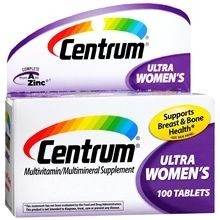Pfizer ‘respectfully requests’ the FDA to reconsider phytosterol rule change
In a comment to the FDA lodged on October 24, Pfizer Consumer Healthcare's director for worldwide regulatory strategy/US dietary supplements, Elizabeth Zafonte “respectfully requests” the FDA to expand the health claim to supplements using non-esterified phytosterols in tablet form provided certain criteria are met.
She said: “The proposed rule doesn’t currently include non-esterified phytosterols in a dietary supplement matrix. Hence… [it] restricts dietary supplements, including [Pfizer’s best-selling supplement] Centrum Cardio from accessing the health claim previously permitted by enforcement discretion.”
Centrium Cardio has 'comparable efficiency' with esterified phytosterols
She added:“Pfizer asserts that dietary supplements containing non-esterified phytosterols that meet the following ‘Nature of the Food Eligible to Bear the Claim’-type criteria, have comparable efficacy with esterified phytosterols in a food matrix and therefore should be eligible to make the health claim."
These criteria include:
1) Meeting USP’s disintegration method for multivitamins
2) Demonstrating the non-esterified phytosterols efficiently disperse from the tablet matrix and demonstrate significant efficacy in blocking cholesterol uptake into the mixed micelles using a TNO TIM-1 or comparable model.
Assay methods for phytosterols
Zafonte also takes issue with the FDA’s recommended method for testing phytosterols in food and dietary supplement matrices, adding: “The [FDA’s] proposed rule recommends the Sorenson and Sullivan method for assaying phytosterols in food and dietary supplement matrices.
"[But] of the five major sterols contributing to the Nature of the Substance, the Sorenson method measures only three of the five sterol components. Omission of selected sterols may falsely report low potencies due to compositional differences related to phytosterol source."
Instead, Pfizer recommends the use of "an appropriately validated method based on the Clement method", said Zafonte. This would be "both simpler to perform and includes most of the major sterols found in various raw material sources used in foods and supplements".
Time is running out
The Council for Responsible Nutrition (CRN) has also urged the FDA to rethink its Dec 2010 proposal to discontinue its policy of enforcement discretion on phytosterol health claims, which has allowed claims on supplements containing free phytosterols since 2003.
The proposal came as rude shock to the trade given that the FDA’s 2003 enforcement discretion letter “unequivocally stated that enforcement discretion would remain in effect until issuance of a final rule”, said CRN vice president, scientific and regulatory affairs, Duffy Mackay
“[This] has created an untenable situation for the dietary supplement industry.”
As the official date for enforcement discretion to end is February 2012, supplement makers now have less than three months to change their labels and formulations to comply with the Dec 2010 proposal, said Mackay.
The CRN is calling for the FDA to continue to exercise enforcement discretion in accordance with the 2003 letters until the effective date of the final rule, “or, at a minimum, until the next uniform compliance date for food of January 1, 2014”.
















